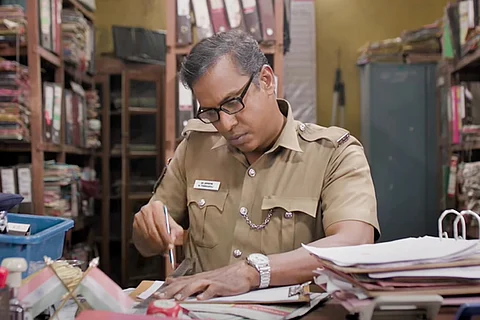

Courage and compassion are the foremost words that suggest themselves about Franklin Jacob’s debut film Writer. The lives of policeman Thangaraj (Samuthrakani), whose job it is to take down FIRs, and Deva, a young PhD scholar (Hari Krishnan), inextricably cross paths, each cementing the other’s future.
After decades in the force, Thangaraj is a jaded cop struggling to hold on to his humanity within a system that primarily serves power. This power, director Franklin plainly shows us, is not only stacked against those made vulnerable by caste and class, but also permeates through every inch of the system itself. Hierarchies are enforced mercilessly both within and outside the police system, Writer depicts with pristine clarity. Early in the film, a character reminds viewers about the origins of the police across the world— “they were enforcers for the coloniser”. And “post-Independence, they continue to function as the strong arm of the ruling class”. While the fearlessness of this young director awes you, you are also moved by his empathy that drives the film.
Deva, a Dalit Christian, is an example of the extra-judicial tactics, wrongful arrests, custodial torture, the foisting of false charges that Dalit, tribal and religious minority people in India are routinely subjected to. Franklin ensures the prevalence and the measures used for all these violations register with his audience. And then he surprises you. The mental health of policemen, the taxing work hours, the shortcuts taken, the horrors and irrevocable damages to one’s conscience, simply put the human cost of the system, is an aspect Franklin insists you ponder on, without allowing it to be an excuse for police excesses.
To accomplish this would require a solid political grounding that the director doubtless has. Too often, mainstream cinema attempting to speak on social justice shoots itself in the foot by humanising perpetrators. Vetrimaaran’s segment in Pava Kadhaigal, for example, after dedicating itself to denouncing “honour” killings for inter-caste marriages, dilutes its own stance by inserting into the plot the collapse of a father who has just poisoned to death his pregnant daughter. Given how prolific such cases in real life are, often with scant instances of justice delivered to the killers, that was not a juncture to ask compassion for a murderous parent consumed by his casteism.
Instead, Franklin depicts how casteism not only criminalises some communities, it also has a stranglehold within the police system. Showing how this system is unwilling to reform its internal hierarchies of rank or caste or gender is how the director superbly delivers a Tamil cop film so refreshingly different from the industry’s norm.
Writer, in that regard, serves as a scathing indictment of Tamil cinema’s obsession with valourising police excesses in films like Theri, Darbaar, the Singam trilogy or the many, many others that have come out over the decades. The lead police character isn’t played by a suave (often young) hero mouthing punch dialogues to justify his violence. Against this grain is an ageing Samuthrakani, deskbound, frequently winded for breath, unheroic, ethically compromised and grasping at straws to make amends. The film leaves us to decide whether or not he has found redemption, if it is even possible at all.
And the director doesn’t fail to mention that gender and caste smother the hopes of many women, through a mostly powerful sequence performed flawlessly by Ineya.
Writer takes on the unenviable task of turning various complex political layers into a compelling story. Yet, Jacob’s script and plotline are taut, tense and keep you at the edge of your seat.
Samuthrakani and Hari Krishnan are in impeccable form. At no point do you lose connection with either of their characters. It was wonderful to see Samuthrakani and Dileepan back on screen together after they played uncle Vaaliyappan and nephew Selvam in Kaala. Equally exciting was to see so soon again GM Sundar (Duraikannan Vaathiyar from Sarpatta Parambarai) as a dedicated, no-nonsense lawyer. Govind Vasantha’s musical score fits organically into the film, sometimes muted, sometimes bombastic, always just right.
Someone I know noted after the film that Writer represents hope. I agree. Franklin offers hope for overdue police reform, hope for Tamil cinema directors to give up the hero-cop formula. When the custodial torture and death of Jayaraj and Bennix in Sathankulam was all over the news in 2020, many on social media lazily borrowed the language of the Black Lives Matter movement in the US. Calls for #defundthepolice trended on multiple sites. The fleeting outrage, joined in by film celebrities (with little introspection about their own part in normalising the same kind of violence), did not take into account the realities specific to India. Some of the latest reports on India’s prison population show that for 17 years up until 2019, 64% of undertrials are either Scheduled Caste, tribal or Other Backward Class people. Seven out of 10 prisoners are undertrials, National Crime Records Bureau’s (NCRB) 2019 data revealed. In the first five months of 2021 alone, 1,067 custodial deaths were reported.
Releasing in mainstream venues, in the same theatres that would have run big budget cop films to full houses, maybe, hopefully, this film helps spread a political language tuned to the systemic failures in this country.
Writer, releasing in theatres today, December 24, is a film you don’t want to miss. Franklin Jacob is every bit deserving of the thunderous applause his preview audience gave him. This is a director whose forthcoming projects we’ll all keenly be watching out for. The film is bankrolled by Pa Ranjith’s Neelam Productions, Little Red Car, Golden Ration Films and Jetty Productions.